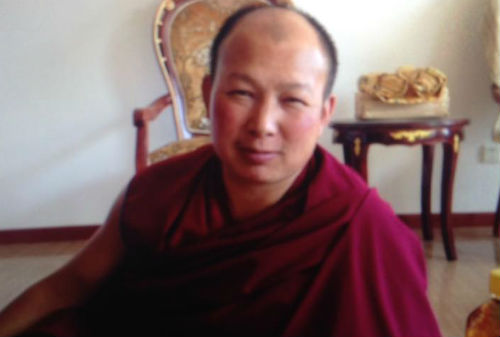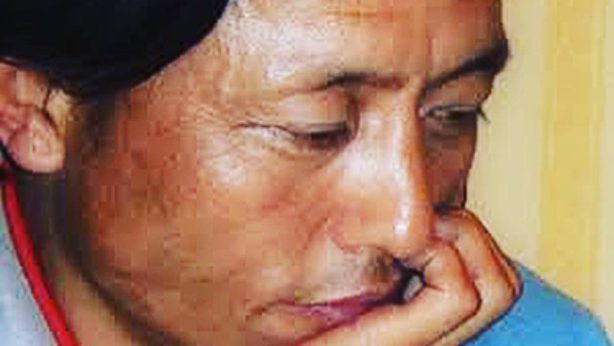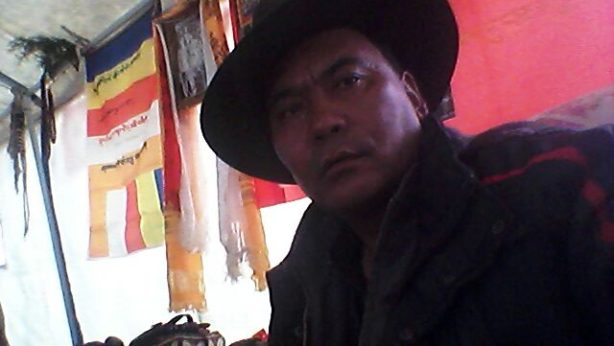Tibetan monk imprisoned for Dalai Lama pictures released after two years

A Tibetan monk was released from prison last month after serving two years sentence for storing pictures of the Tibetan spiritual leader His Holiness the Dalai Lama and for sharing the same on social media.
Gomar Choephel, 48, was released in the second week of July from Haomen Prison located in Haomen Township in Semnyi (Ch: Menyuan) Hui Autonomous County, Tsojang (Ch: Haibei) Tibetan Autonomous Prefecture, Qinghai Province. It is the same prison where the prominent Tibetan blogger Drukar Gyal aka Shokjang is imprisoned.
Gomar Choephel is a monk at Rongwo Monastery in Rebkong (Ch: Tongren) County, Malho (Ch: Huangnan) Tibetan Autonomous Prefecture, Qinghai Province, in Tibetan province of Amdo.
As reported earlier by TCHRD, Gomar Choephel was arbitrarily detained from his monastery on 10 July 2015. Before taking him into custody, Chinese security personnel ransacked his room and searched through his belongings. During the search, the security personnel came upon pictures of Dalai Lama that gave them the pretext to detain him. After seven months of secret detention, he was sentenced to two years’ imprisonment on the trumped up charges of “threatening social stability” and “engaging in separatist activities” without due process of law.
It appears that Gomar Chophel was primarily targeted for storing pictures of Dalai Lama on his mobile phone and sharing them on social media sites with the caption: ‘There is no stability without equality.’
Although TCHRD welcomes Gomar Choephel’s release, he should never been imprisoned. His imprisonment violates the fundamental right to freedom of thought, conscience and religion as guaranteed in Chinese and International Law. By criminalising the act of worshipping one’s spiritual leader, the Chinese authorities have further confirmed that religious repression has worsened to an entirely new level in Tibet.
Fellow monks and relatives of Gomar Choephel had turned out in huge numbers outside the prison to welcome the monk on his release. But the police did not allow them to take any pictures.
During his imprisonment, Gomar Choephel was forced to work daily for long hours making all kinds of articles from military uniforms and clothing made of down feather to barb wires at the Haomen Nongchang prison labour farm.
For now, Gomar Choephel is allowed to participate in prayer ceremonies at his monastery. However, he is closely monitored by local police and his movement is restricted as he is not allowed to travel outside his hometown. This restriction is commonly applied to all political prisoners soon after their release. It is part of the additional sentence of deprivation of political rights that many former political prisoners have to serve after their release from prison.
At Haomen prison, Tibetan political prisoners can meet with their family and relatives once every month. Each visit lasts for 30 minutes. But they have to speak in Chinese to make full use of the visit duration. The visit is cut short to five minutes if they chose to speak in Tibetan. Prison guards also film the visits.
It is true that family and relatives of Tibetan political prisoners have no choice but to speak in Chinese. If they are unable to speak in Chinese, they have to ensure that there is someone who can interpret the conversation so that the prison guards monitoring the visit understand every detail of the conversation. Each prison visit usually lasts for 30 minutes and if the visiting relatives spoke in Tibetan, there would be less time to converse because half of the time would be spent on interpreting for the benefit of the prison guards. Tibetan political prisoners are also more closely monitored than other prisoners.
Article 47 of the Law of the People’s Republic of China on Regional National Autonomy states, “Courts of law and offices of public prosecutors in autonomous areas should use the locally common language in their official business, guarantee citizens of all minority nationalities the right to use their native languages in lawsuits and trials, provide interpreters when the parties involved do not understand the locally common language, and adopt one or more locally common languages in legal documents according to actual needs.” But this is not happening in practice.
According to accounts by families of political prisoners in Tibet, official proceedings in the Chinese justice system are being conducted in Mandarin Chinese and inmates are forced to speak in Mandarin Chinese to their visitors in order for Chinese prison guards to understand their conversations. In this way, inmates and their families are being denied the ability to communicate in their native tongues, which creates a deficit in the quality of conversation and closeness between families and their detained loved ones. Thus, no equality of service exists within the justice system in Tibet as it is dominated by Mandarin Chinese language. Article 9 of the Chinese Criminal Procedure Law guarantees the same right to citizens of all nationalities the right to use their own language. By applying discriminatory standards to Tibetan detainees, Chinese authorities violate both domestic and international legal provisions that prohibit discrimination in the criminal justice system on account of one’s ethnicity, religion or language.
Gomar Choephel, 48, was born in Gomar Village in Nyenthog (Ch: Nianduhu) Township in Rebkong County. He became monk at a young age and joined the Thoesam Norling College at Rongwo Monastery. At the time his detention, he was a student of the Vinaya class in the monastery’s college.


